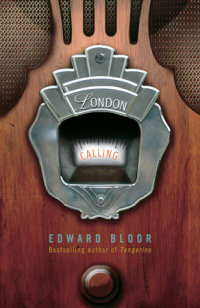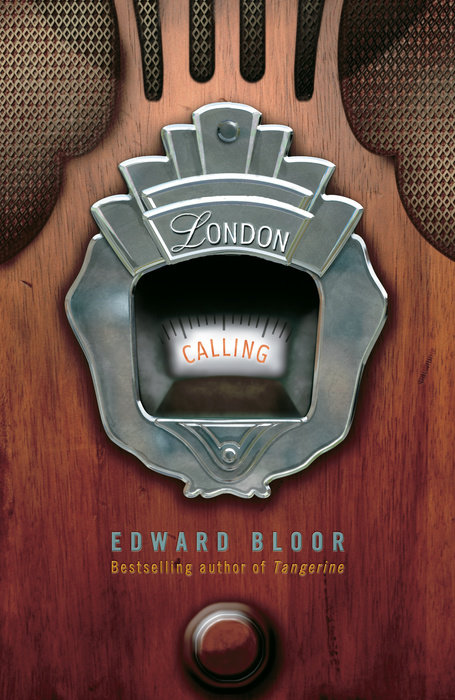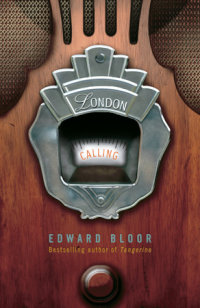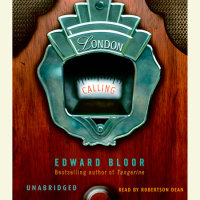London Calling
Martin Conway comes from a family filled with heroes and disgraces. His grandfather was a statesman who worked at the US Embassy in London during WWII. His father is an alcoholic who left his family. His sister is an overachieving Ivy League graduate. And Martin? Martin is stuck in between--floundering.
But during the summer after 7th grade, Martin meets a boy who will change his life forever. Jimmy Harker appears one night with a deceptively simple question: Will you help?
Where did this boy come from, with his strange accent and urgent request? Is he a dream? It's the most vivid dream Martin's ever had. And he meets Jimmy again and again--but how can his dreams be set in London during the Blitz? How can he see his own grandather, standing outside the Embassy? How can he wake up with a head full of people and facts and events that he certainly didn't know when he went to sleep--but which turn out to be verifiably real?
The people and the scenes Martin witnesses have a profound effect on him. They become almost more real to him than his waking companions. And he begins to believe that maybe he can help Jimmy. Or maybe that he must help Jimmy, precisely because all logic and reason argue against it.
This is a truly remarkable and deeply affecting novel about fathers and sons, heroes and scapegoats. About finding a way to live with faith and honor and integrity. And about having an answer to the question: What did you do to help?
An Excerpt fromLondon Calling
The Heroes’ Walk
Looking back now, I can see that I spent my seventh-grade year in a state of depression, imprisoned behind the red-brick, black-iron walls of All Souls Preparatory. All Souls is a private, mostly Catholic school in Bethel, New Jersey, about twenty miles east of Princeton.
Back when I was a student, All Souls had two prominent statues on the campus. Franklin D. Roosevelt stood outside the Student Center, which was a little strange since the real President Roosevelt couldn’t stand. Yet there he was, with one hand on a cane and the other hand raised in a friendly wave. John F. Kennedy, the first Catholic president, stood outside Kennedy Hall. He was pointing energetically into the air, as if he were speaking.
On the last day of school that year, I was sitting in class in Kennedy Hall and looking through the window at FDR. Across the road, the Lowery Library was nearing the end of a major renovation. As part of this, Father Thomas, the headmaster of the school, had decreed that the statues of Presidents Roosevelt and Kennedy were to be moved to join a new statue of General Henry M. “Hollerin’ Hank” Lowery in an impressive new entranceway to the library. The entrance would consist of the three statues, a brass informational plaque about each one, and a slab with the words the heroes’ walk carved into it.
That was why Father Leonard, my history teacher, was spending one last class period droning on about World War II and the heroic efforts of General Henry M. Lowery to alert America to the dangers of Adolf Hitler and Nazism. Father Leonard was the twin brother of the headmaster, Father Thomas. They had both attended All Souls Preparatory some thirty years before; now the paths of their lives had circled around and brought them both back to their beloved alma mater.
I hated All Souls Preparatory.
I hated the uniforms; I hated the snobbery; I hated the tradition. I was an outcast there, and I associated only with other outcasts. One of them, sitting immediately to my left, had just raised his hand.
Father Leonard pointed to him warily and said, “Mr. Chander, I trust this comment is pertinent.”
“Oh yes, Father. It is most pertinent.”
“Fine. Then you may proceed.”
“I read that General Lowery was not really opposed to the Nazis. In fact, he thought the Nazis would win the war easily, and he advised President Roosevelt to make a deal with Hitler as soon as he could.”
Father Leonard looked pained. “I don’t think those are facts, Pinak. But if you would care to do some independent study in that area, I will give you extra credit for your research.”
“I don’t need any more credit, Father. I already have an average far above one hundred. I just wanted to perhaps start a discussion.”
“No. We need not discuss rumors and half-truths and falsehoods. The historical record is perfectly clear about what the General wrote and said at the time.”
Pinak gave up. “Yes, Father.”
Father Leonard always looked uncomfortable when talking about the late General Lowery. Fathers Leonard and Thomas both believed, faithfully, in the legend of Lowery as a fierce Hitler-hater and Nazi-fighter. In return for that faith, the Lowery family had established a million-dollar trust fund for All Souls Preparatory. All Souls had been General Lowery’s prep school, back when it was all boys and they all lived there. Then it was his son’s and his grandson’s prep school, and now it was his great-grandson’s prep school. That great-grandson, Henry M. Lowery IV, was seated in front of me and to the left. Hank Lowery was what is known there as a “legacy.”
I, on the other hand, was what is known there as a “scholarship.” Worse than that, I was an “employee scholarship.” My mother worked as Father Thomas’s secretary, and, thanks to that, I was allowed to attend the school tuition-free. My mother had worked the same deal for my sister Margaret, who had excelled at All Souls and then gone on to Princeton, where she earned a degree in history. My future prospects, however, were not so bright. Unlike Pinak, who was an academic star, I barely scraped by with C’s.
The only other kid I really associated with was Manetti. I knew him from sixth grade back at Garden State Middle School. He was an employee scholarship, too. His father was in charge of buildings and construction at All Souls, which meant that Manetti actually had it worse than me. At least my parent was hidden away in an office. His was very visible—always walking around on campus in an orange hard hat, or driving around noisily in one of his company trucks. I was watching one of those Manetti Construction trucks unload equipment when the girl in front of me turned and handed me a note.
There was no name on the note, so I set it on the corner of my desk, temporarily ignoring it until I heard a sharp, throat-clearing noise. I glanced up and saw the red, erupted face of Hank Lowery IV. He pointed a stubby finger at the note. I obediently picked it up, opened it, and read this printed message:
You’re dead.
I looked back at Lowery, puzzled. He clenched his jaw and then shook his large head from left to right. He pointed first to the note and then to Pinak. When I finally understood his message, I passed the note over. As Pinak opened the note and read those two words, his dark Indian complexion turned pale with fear.
Shortly after that exchange, Father Leonard’s lifeless lecture, and the school day, and the school year, all came to an end with the ringing of the bell.
As we did every day, Pinak, Manetti, and I walked together to the Administration Building. Manetti and I had to wait for our employee parents to finish work; Pinak simply had nothing better to do. He asked his mother to pick him up later so that he could hang out with us. On that day, he probably regretted that arrangement.
Even before we got out of the classroom, some kid muttered to Pinak, “Lowery’s gonna kick your ass outside.”



